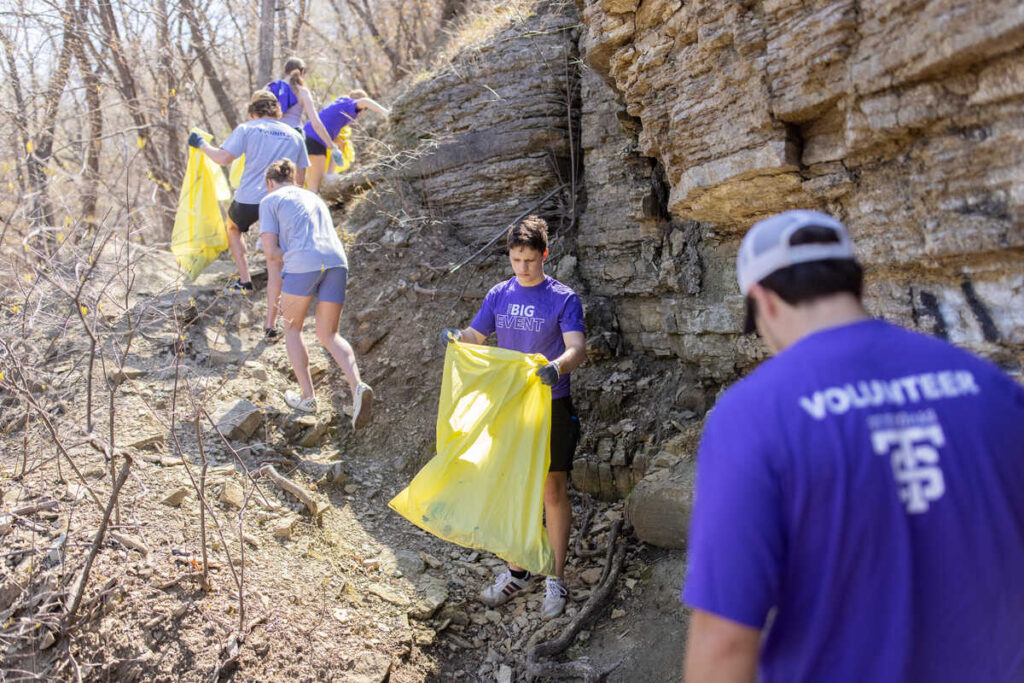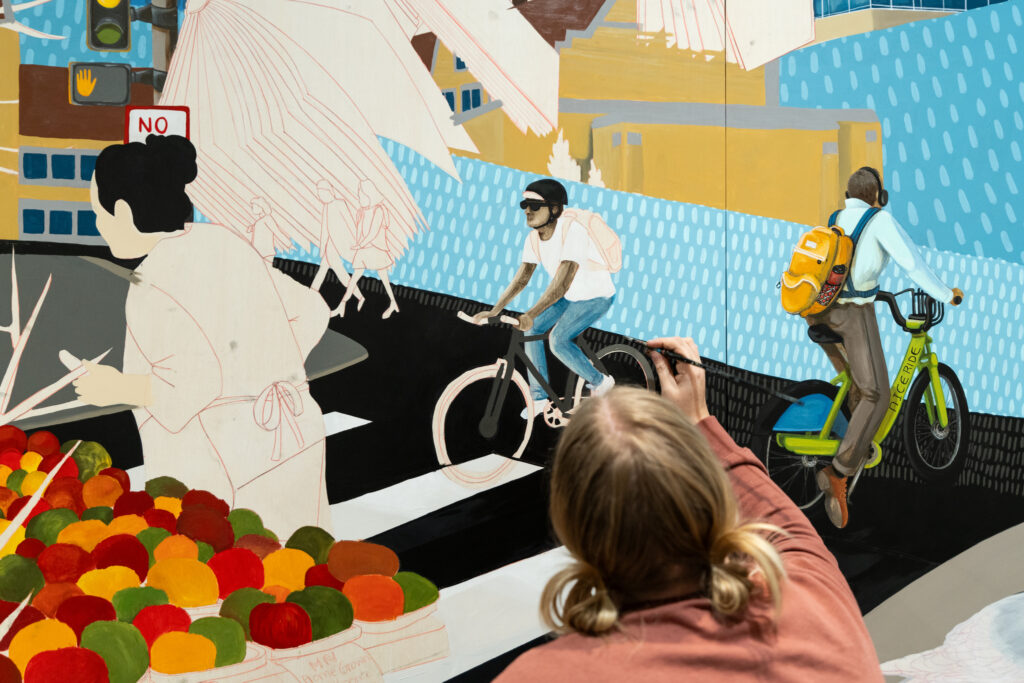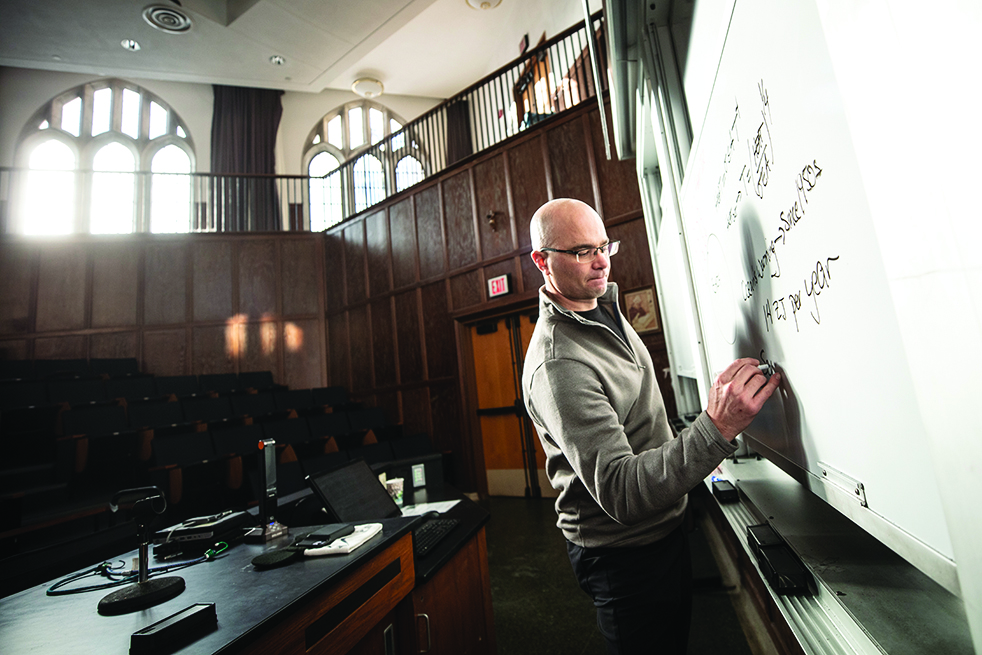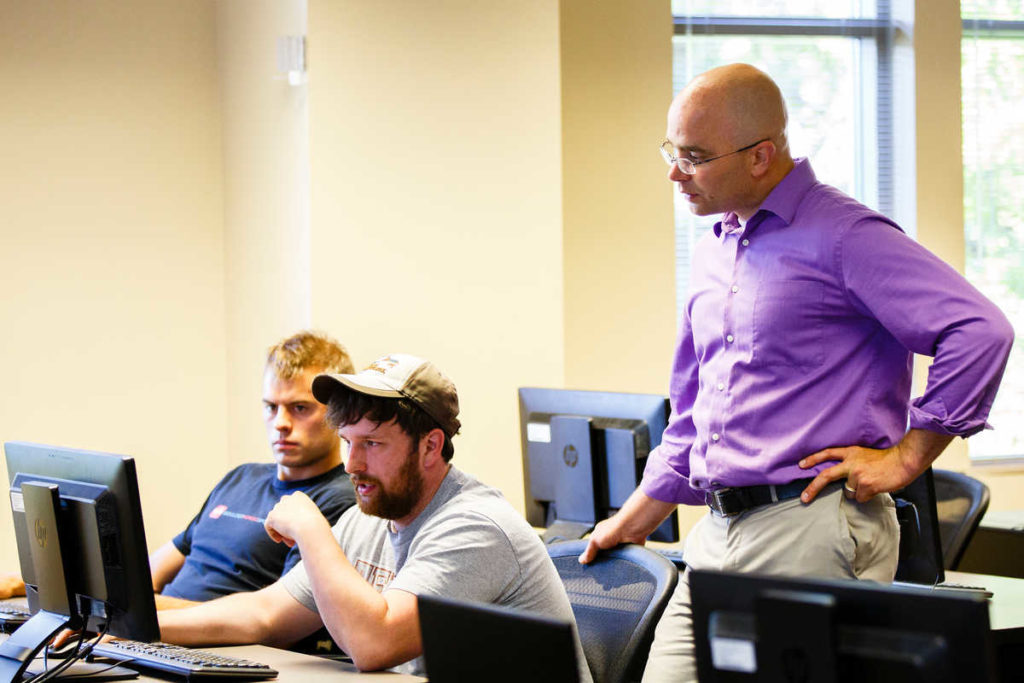'Green' efforts at St. Thomas gaining momentum
In a convocation address last September, Father Dennis Dease, president of the University of St. Thomas, called on the St. Thomas community to think creatively about how it might start a commitment to sustainable living. What happened next was Dease's series of "Three Great Conversations on Sustainability and Care of the Environment," the last of which, "Taking the Next Step," is on Earth Week's event roster and will be held from 4 to 6 p.m. Thursday, April 24, in the third-floor lounge of Murray-Herrick Campus Center.
This semester, University Relations responded to Dease's call by creating a sustainability working group. The group, which meets twice a month, formed on the heels of a half-day UR retreat on sustainability in January. Its goal is to take active steps in making its digs in Loras Hall a bit "greener."
Bob Douglas, coordinator of recycling and central receiving, led the retreat. Speakers included Dr. Camille George of St. Thomas' School of Engineering; Trent Rehberger, a student on UST's Green Team; and Dan Young Dixon, director of design at Opus Architects & Engineers Inc.
The eight UR staff members in the group already have made several small but positive changes in reducing the department's waste and energy consumption. The department:
- Replaced all nonoverhead lights with compact fluorescent bulbs.
- Replaced paper plates/bowls and plastic utensils with secondhand ceramic dishware and flatware.
- Switched its coffee to Juan Ana, a family-operated company in Guatemala.
- Switched to nontoxic, biodegradable cleaning products.
- Created used battery and plastic bag collections, which staff members recycle.
- Programmed most printers to quicker ‘sleep'times.
- Reduced amount of junk mail by designating a junk mail box; student workers contact the senders and request removal from mailing lists.
- Eliminated plastic-bottled beverages from all meetings.
The department now orders recycled paper from the Service Center, prints on both sides of paper and has assigned some printer trays for this use, relying on IRT notices of computer updates and leaving computers on only when needed. It also stores hot coffee in a thermal carafe, turning on its coffee maker only when brewing.
Brian Brown, director of publications, who helped organize the retreat, said, "sustainability and reducing waste are no longer thought of as issues only hippies and Green Party candidates are interested in – although we are grateful for their leadership in this area. We all have to do our part, and we hope our efforts will encourage other departments to join us. It doesn't take much to make a difference."
St. Thomas joins AASHE
St. Thomas recently joined the Association for the Advancement of Sustainability in Higher Education, a member organization of colleges and universities in the United States and Canada working to create a sustainable future. The organization gives members the opportunity to sign the Presidents Climate Commitment, a pledge in which American colleges and universities undertake an action plan toward making their campuses carbon neutral-and publicly share their progress, although not all members do so.
To date, 15 Minnesota schools have signed the commitment. Those schools are: Augsburg College, Carleton College, Century College, the College of St. Benedict, Dakota County Technical College, Gustavus Adolphus College, Macalester College, Minneapolis Community and Technical College, Minnesota State Community and Technical College, Rochester Community and Technical College, St. John's University, the University of Minnesota, the University of Minnesota-Morris, Vermilion Community College and Winona State University.
Dr. Gene Scapanski, vice president for mission, said that Dease will consider signing the commitment after further examination of both St. Thomas'carbon footprint and the implications of the commitment.
A geography professor's effort
Dr. Paul Lorah, of the College of Arts and Sciences' Geography Department, is involved in an effort to help make St. Thomas carbon-neutral. Last week he finished writing a grant proposal for a project, "Service Research and Restoration: Creating the UST Carbon Reserve."
If the proposal is accepted, St. Thomas will be able to purchase degraded land in Minnesota. The property would serve as a lab for students and faculty, who would conduct research and service-learning restoration on it. As the land recovers, it will "sponge up" carbon in the air, Lorah explains. The students'task would then be to measure just how much carbon it absorbs.
It is Lorah's hope that this project will be the start of making St. Thomas carbon-neutral.
Last semester the Geography Department took further action by conducting a carbon audit of their department. Faculty members took into account the travel times of car-commuting students to campus, airline travel for academic conferences and the energy required to power their computer labs and heat their offices and classrooms, among other factors.
Their results showed that their department released approximately 22 tons of carbon into the atmosphere last year.
Among the measures they took to reduce their carbon output were to arrange for IRT to automatically shut down the computers in the GIS lab each evening, to post student readings on Blackboard instead of printing them and to use both sides of paper for printing.
Sustainability across campus
Dr. Elise Amel, of the College of Arts and Sciences'Psychology Department and the director of Environmental Studies program, has noticed increased momentum toward sustainability issues on campus.
She noted that more than 30 faculty members from departments across campus have attended "faculty development seminars"on integrating sustainability into their courses. This means that between 30 and 100 courses during the 2007-08 academic year contained an environmental component.
Many departments are getting involved in sustainability efforts informally.
UST's Daniel C. Gainey Conference C
enter in Owatonna switched to compact fluorescent bulbs three years ago, recycle their horse manure as fertilizer and buy local, organic produce and flowers for events.
The Luann Dummer Center for Women reports that it has eliminated plastic bottles from all meetings.
Several academic departments cited a strong commitment to recycling paper, plastics and glass.
The Child Development Center has begun working sustainability into its curriculum, teaching children the importance of picking up trash and reusing materials. To that effect, Rebecca Swiler, director of the center, explains, a "tremendous amount of recycled products are used in the children's artwork." She also notes that the children learn about local, organic produce by planting-and eating-vegetables in the gardens around the building.
The center also hosts a clothing exchange. The message it gives parents: "Just because something is used, doesn't mean it can't be useful." Swiler notes that the center has reduced its own waste over the last 10 years by converting many of its printed forms and newsletters to electronic formats.
Student sustainability groups
Student groups at UST also are dedicated to making the campus and beyond more sustainable.
- Engineers for a Sustainable World –The UST chapter of this national organization was founded last spring by seniors Andrew DePompolo, Steven Lay and Andre Trawick. Dr. Camille George is the founding adviser.
The group's recent projects include investigating composting and biodiesel possibilities at UST, educating the campus on the benefits of LEED certification and creating signs on garbage cans in Owens Science Hall and O'Shaughnessy Science Hall as reminders to recycle. Outside of St. Thomas, the group participated in the Tanzania Water Project, installing two solar water pasteurizers near two schools in northwest Tanzania.
For more information about ESW, email eswust@gmail.com.
- The Green Team exists to "challenge St. Thomas to be a more ecologically sound campus and to raise environmental awareness within our community, both on and off campus."The group regularly organizes educational activities, which have included campouts and yearly field trips to apple orchards and the Anathoth Community Farm, a Luck, Wis., commune focused on maintaining a negative carbon footprint.
The Green Team is a small-but-active group and welcomes new teammates. If you are interested in joining, contact Angie Taffe or Matt Sweeney.
- Undergraduate Student Government's Student Sustainability Committee tackles sustainability issues, too.
The committee has arranged for the UST Food Service to provide reusable drinking containers, available at a discount, at all campus dining facilities. It also worked with Student Orientation and Campus and Residence Life to educate incoming students and resident assistants on eco-consciousness, and lobbied successfully for a position to calculate UST's carbon footprint and assessing future actions.
For more information about the Student Sustainability Committee, contact Carl Mickman.
- BEAST is Bicycle Enthusiasts at St. Thomas, a group that promotes bicycle awareness and advocates for bicycle commuting.
Last fall, BEAST collected 15 used bikes, which its members will repaint and soon make available to UST students, faculty and staff for running errands and commuting.
To get involved with BEAST, contact Warren Gall.
Lorah sums up the concept of carbon neutrality simply: "If you make a mess, you should clean it up."
What is your department doing to reduce waste and energy consumption? Let us know here.






